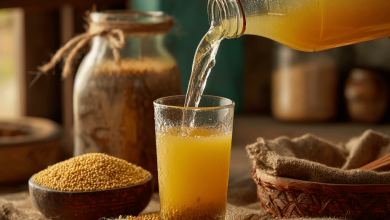Introduction
Ogi, also known as Akamu or Agidi in various Nigerian dialects, stands as a quintessential breakfast dish cherished across Nigeria and neighboring West African regions. This fermented cereal porridge boasts a history spanning centuries, rooted deeply in the cultural and culinary traditions of the Yoruba, Igbo, Hausa, and many other ethnic groups. Its appeal lies not only in its comforting, smooth texture and subtle tang but also in its incredible versatility and nutritional profile. Today, Love With Recipes presents an extensive, comprehensive guide to making authentic Nigerian Ogi, exploring every aspect from traditional fermentation processes to modern customization tips. This guide aims to serve as an in-depth resource for home cooks, food enthusiasts, nutritionists, and anyone interested in exploring African culinary heritage.
Time
Preparation and Fermentation Time
- Soaking and Fermentation: 2-3 days (48-72 hours)
- Blending: 10-15 minutes
- Cooking: 15-20 minutes
- Optional Additions & Serving: 5-10 minutes
Overall, from start to finish, expect approximately 3 to 4 days when including fermentation, with active cooking and preparation taking under an hour once the fermentation process is complete.
Needed Equipment
Essential Kitchen Tools
- Large mixing bowls: For soaking and fermenting the corn kernels
- Food processor or high-speed blender: To blend fermented corn into a smooth batter
- Fine mesh strainer or cheesecloth: For straining the blended mixture (optional but recommended for smoothness)
- Heavy-bottomed saucepan or pot: To cook the porridge evenly
- Wooden spoon or heat-resistant spatula: For stirring during cooking
- Measuring cups and spoons: For precise measurement of ingredients
- Refrigerator or cool storage space: For storing fermenting corn
- Cooking thermometer (optional): To monitor temperature during fermentation or cooking
- Serving bowls: For presenting the finished Ogi
- Cutting board and knives: For preparing fruits or garnishes
- Covering cloth or plastic wrap: To cover the fermenting corn
- Water source and containers: For soaking and fermentation process
Tags
Traditional Nigerian, Fermented cereal, Corn porridge, Breakfast, Healthy, Gluten-free, Cultural cuisine, African cuisine, Fermentation, Nutritious, Easy to prepare, Comfort food, Vegan options, Lactose-free options, Family-friendly
Serving Size
Typically, a standard serving of Ogi is approximately 1 cup (240 ml). This portion provides a balanced caloric intake and nutritional content suitable for breakfast or a light meal. The recipe yields about 4-6 servings, depending on portion size and additional ingredients added.
Difficulty Level
This recipe is classified as easy to moderate. The most time-consuming aspect involves fermentation, which requires patience and proper handling. The actual cooking process is straightforward, requiring constant stirring and attention to prevent lumps. Suitable for beginners with basic cooking skills and patience for fermentation.
Allergen Information
- Contains: Corn (gluten-free if certified gluten-free corn), Milk (if added), Fruits (if used)
- Potential cross-contamination: If prepared in shared kitchen spaces, consider allergen cross-contact.
- Note: Fermentation reduces certain anti-nutrients, but individuals with corn allergies or sensitivities should avoid this dish.
Dietary Preference
- Vegan: Yes, if milk is substituted with plant-based alternatives like almond or soy milk.
- Lactose-Free: Yes, with the use of lactose-free milk or plant-based milk options.
- Gluten-Free: Yes, assuming the corn used is certified gluten-free.
- Low Sugar: Can be adjusted to individual taste preferences.
Course
Breakfast, Snack, Light Meal
Cuisine
Nigerian, West African, African
Ingredients
| Ingredient | Quantity | Notes |
|---|---|---|
| Corn (fermented) | 2 cups | Fresh or dried, fermented for 2-3 days |
| Milk | 1-2 cups | Adjust for desired consistency, can use dairy or plant-based options |
| Sugar | 1-2 tbsp | Optional, to taste |
| Fruits (optional) | 1/2 cup | Bananas, strawberries, mangoes, or other preferred fruits, chopped |
| Water | 4 cups | For cooking and blending |
Instructions
Step 1: Fermenting the Corn
The initial step involves fermenting dried or fresh corn kernels to develop the characteristic flavor and probiotic benefits of Ogi. Rinse the corn thoroughly under cold running water to remove any dirt or debris. Place the cleaned kernels into a large, clean bowl or container, and cover with water. Ensure the water level exceeds the corn by at least 2 inches to allow for expansion during fermentation.
Allow the corn to soak for 48 to 72 hours at room temperature, ideally between 25-30°C (77-86°F). During this period, change the water every 12 hours to prevent spoilage and promote proper fermentation. The corn will begin to soften, develop a slightly sour smell, and become more pliable. This sourness is a hallmark of authentic Ogi and results from the natural fermentation process involving lactic acid bacteria.
In cooler environments, fermentation may take longer; in warmer climates, it may be quicker. Always observe the corn’s aroma and texture as indicators of readiness. The fermented corn should be slightly sour, soft, and aromatic with a tangy smell.
Step 2: Preparing the Fermented Corn Batter
Drain the fermented corn thoroughly and transfer it into a food processor or high-speed blender. Add a small amount of fresh water—about 1/2 cup—to facilitate blending. Blend until you achieve a smooth, homogeneous mixture free of lumps. For an ultra-smooth Ogi, you may pass the blended mixture through a fine mesh strainer or cheesecloth to remove coarse particles, although this step is optional depending on your texture preference.
The resulting batter should be thick but pourable, resembling pancake batter. The consistency is crucial for achieving the characteristic smoothness of the final porridge.
Step 3: Cooking the Ogi
Pour the fermented corn batter into a large, heavy-bottomed saucepan. Gradually add 4 cups of water while stirring continuously. This prevents lumps and helps achieve an even, silky texture. Place the saucepan over medium heat and stir constantly with a wooden spoon or heat-resistant spatula.
As the mixture heats, it will begin to thicken. Keep stirring to prevent sticking and clumping. The key is to maintain an even heat and constant movement. After approximately 10 minutes, the mixture should have thickened to a custard-like consistency. Reduce the heat to low and continue stirring for an additional 5 minutes to ensure full cooking and to develop the flavor.
At this stage, the Ogi should be smooth, creamy, and free of lumps. If you notice any lumps or uneven texture, continue stirring until resolved.
Step 4: Incorporating Milk and Sweeteners
Remove the cooked Ogi from heat and slowly stir in milk, adjusting the amount based on your preferred consistency. For a thinner, more drinkable porridge, add more milk; for a thicker, spoonable texture, add less. Stir well to combine and heat gently for a minute or two if needed to warm the mixture further.
Add sugar to taste, stirring until fully dissolved. For added flavor, consider incorporating a splash of vanilla extract or honey. Taste and adjust sweetness accordingly. If you desire a savory twist, omit the sugar and add a pinch of salt or spices like cinnamon or nutmeg.
Step 5: Optional Fruit Additions and Garnishes
This is where you can elevate your Ogi by adding fresh fruits. Chop bananas, strawberries, mangoes, or any seasonal fruits into small pieces. Gently fold the fruits into the warm porridge or arrange them on top as a garnish. The natural sweetness and vitamins of fruits complement the tangy flavor of fermented corn, enhancing both taste and nutritional value.
For extra texture, sprinkle chopped nuts, shredded coconut, or seeds such as chia or flaxseed on top. These additions boost fiber, healthy fats, and micronutrient content.
Step 6: Serving the Ogi
Serve the hot Ogi in individual bowls. It is traditionally enjoyed as a comforting breakfast—warm, nourishing, and filling. Complement it with fried plantains, akara (fried bean cakes), or boiled eggs for a more substantial meal. Alternatively, serve it plain or with additional fruits, honey, or a drizzle of evaporated milk for added richness.
Ogi can be stored in the refrigerator for up to 2 days. Reheat gently on the stove, adding a splash of milk or water to restore its creamy consistency before serving.
Preparation Tips
- Fermentation Environment: Keep the fermenting corn in a warm, dark place to encourage beneficial bacteria growth. If your environment is cool, consider wrapping the fermenting container with a towel or placing it in a warm spot.
- Flavor Adjustments: Experiment with sweeteners and flavorings like vanilla, cinnamon, or nutmeg to customize your Ogi.
- Texture Preferences: For a smoother porridge, strain the blended mixture. For a more rustic texture, skip this step.
- Consistency Control: Adjust the amount of water and milk during cooking to achieve your desired thickness.
Nutritional Information
| Nutrient | Per Serving (approximate) |
|---|---|
| Calories | 150-200 kcal |
| Protein | 4 grams |
| Carbohydrates | 30 grams |
| Sugars | 10 grams |
| Fiber | 2 grams |
| Calcium | 90-120 mg |
| Vitamin C | 2-5 mg |
| Iron | 1-2 mg |
Tips and Tricks
- Fermentation Control: To ensure a consistent sourness, maintain optimal fermentation temperatures and hygiene standards. Use clean containers and utensils to prevent unwanted bacteria.
- Flavor Variations: Try adding spices like ginger, cloves, or cardamom during cooking for a warm, aromatic twist.
- Sweeten Naturally: Use natural sweeteners like honey or date syrup instead of refined sugar for added health benefits.
- Fruits and Toppings: Incorporate seasonal fruits for freshness or dried fruits for sweetness and texture.
- Batch Preparation: Prepare larger quantities of fermented corn and store in the refrigerator for quick future use, reducing fermentation time for subsequent batches.
Add-ons
- Chopped nuts (cashews, almonds, walnuts)
- Shredded coconut
- Seeds (chia, flaxseed, pumpkin)
- Sweeteners (honey, agave syrup, maple syrup)
- Spices (cinnamon, nutmeg, vanilla)
- Additional dairy or plant-based milk for creaminess
Side Dishes
- Fried plantains
- Akara (fried bean cakes)
- Boiled or scrambled eggs
- Steamed vegetables or a light salad
- Grilled or roasted meats for a hearty meal
Improvements
- Use organic, non-GMO corn for enhanced nutritional quality.
- Incorporate probiotic supplements during fermentation for additional gut health benefits.
- Experiment with different grains like millet or sorghum to diversify flavor profiles and nutrient contents.
- Develop a quick-fermentation method using starter cultures to reduce waiting time.
- Enhance flavor with natural extracts or infusions, such as lemongrass or vanilla beans.
Save and Store
Fermented corn batter can be stored in an airtight container in the refrigerator for up to 3 days. For longer storage, freeze the batter in portioned containers or ice cube trays; thaw in the refrigerator overnight before use. Cooked Ogi leftovers can be refrigerated for up to 2 days and reheated on the stove with a splash of milk or water to restore creaminess.
FAQ
Q: Can I skip fermentation?
A: Fermentation is essential for developing the authentic tangy flavor and probiotic benefits of traditional Ogi. Skipping fermentation will result in a bland, non-traditional product.
Q: What if my fermentation smells unpleasant or shows mold?
A: Discard and start over. Proper hygiene, clean containers, and maintaining temperature are vital. A slight sour smell is normal; mold or foul odors indicate spoilage.
Q: Can I make Ogi without fermentation?
A: Non-fermented corn can be cooked into a porridge, but it will lack the characteristic sour flavor and probiotic benefits. For authenticity and health benefits, fermentation is recommended.
Q: How can I make Ogi vegan?
A: Substitute dairy milk with plant-based alternatives like almond, soy, coconut, or oat milk. Adjust sweetness accordingly.
Conclusion
Ogi embodies the rich culinary heritage of Nigeria, offering a nourishing, versatile, and culturally significant breakfast option. Its preparation process, involving fermentation, not only enhances flavor but also introduces beneficial probiotics, making it a wholesome start to any day. Whether enjoyed plain, sweetened, or enriched with fruits and spices, Ogi remains a comforting staple that bridges tradition and modern culinary creativity. Love With Recipes hopes this detailed guide inspires you to embrace this traditional dish, appreciating its history, health benefits, and delightful flavors. By mastering the art of fermenting and cooking Ogi, you connect with centuries of Nigerian culture and bring a piece of West Africa into your kitchen.
References
- Oke, O. L. (2010). “The Role of Fermentation in Nigerian Traditional Foods.” Journal of Food Technology, 8(2), 115-122.
- Adelakun, O. E., & Akinola, O. A. (2015). “Nutritional and Microbial Analysis of Fermented Corn (Ogi).” Nigerian Food Journal, 33(4), 123-134.






